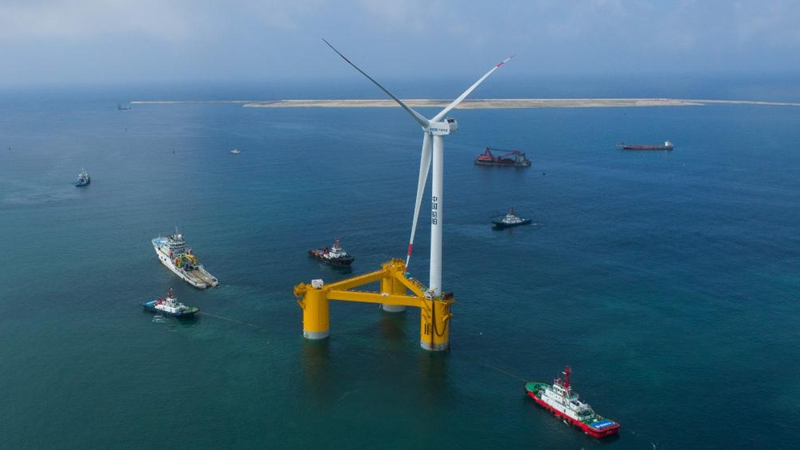
A deep-sea floating wind power equipment "Fuyao" in Maoming, south China's Guangdong Province, May 27, 2022. [Photo/Xinhua]
By Alexander Ayertey Odonkor
On September 22, 2022, the International Renewable Energy Agency, together with the International Labor Organization issued the ninth edition of the"Renewable Energy and Jobs: Annual Review," a joint report that presents the latest estimates of worldwide employment in renewable energy.
Highlights of the comprehensive report shows that the number of people employed directly or indirectly in the renewable energy sector worldwide, increased from 12 million in 2020 to 12.7 million in 2021 – China alone accounts for a whopping 42 percent of the global total, followed by the European Union(EU) and Brazil with 10 percent each, and the United States and India with 7 percent each.
In fact, China's unparalleled contribution to worldwide employment in renewable energy underscores Beijing's unflinching dedication to transition from the use of dirty energy to clean energy such as wind, solar, hydro power and biomass that is the panacea to addressing climate change, one of the biggest existential threats to humanity and the entire planet.
With the energy supply sector being the largest contributor to greenhouse gas emissions, the major driver of climate change which is responsible for about 35 percent of total emissions, China is distinctively focused on tackling this global challenge as it pushes for low-carbon transition, powered by increasing clean energy investments.
With a goal to peak carbon dioxide emissions before2030 and attain carbon neutrality before2060, China's unwavering commitment to realize this daunting challenge has not been derailed by trade disputes, geopolitical rivalries and the lingering impact of COVID-19 in recent years.
China has continued to increase investments in clean energy consistently, driving growth in global clean energy investments. Data from the International Energy Agency (IEA) reveal that in 2021, China once again recorded the highest clean energy investment with $380 billion, followed by the EU ($260 billion) and the U.S. ($215 billion).
Since 2020, clean energy investments have increased at an annual average growth rate of 12 percent, a significant progress in the fight against climate change. For 2022, clean energy investments are expected to account for nearly three quarters of growth in overall energy investments. This reflects a sharp contrast to investment levels for the first five years after the Paris agreement was signed in 2015, when the annual average growth rate was just over 2 percent.

A floating photovoltaic power station in Panji District, Huainan City, east China's Anhui Province, July 20, 2021. [Photo/Xinhua]
However, this growth is misleading as it is concentrated in only a few countries, mainly China and advanced countries. At present, clean energy expenditure in emerging and developing countries (excluding China) remains stuck at 2015 levels – a condition which most likely could have been worse without Chinese investments.
For example, in sub-Saharan Africa (SSA) where China is the largest investor in the region's power sector, data from the IEA show that between 2010 and 2020, renewable sources, including 49 percent from hydropower, account for 56 percent of total energy capacity added by Chinese projects within the specified timeframe. With the support of the Chinese government, Chinese stakeholders have provided the region with integrated solutions in clean energy generation capacity and in transmission and distribution via a combination of Chinese development assistance (loans), equity investment and government-driven investments.
While Chinese investments underpin SSA's growth in renewable energy investments, it is worth mentioning that China's contribution to advancing low-carbon transition in Africa and the world as a whole transcends the investments listed earlier. For example, since 2008 annual patent applications in net-zero energy technologies have grown exponentially, and China is the major driver of global growth.
According to a report (2021) by Elsevier, China had the largest patent portfolio in carbon-free energy technologies by 2015 in the top 10 countries and regions, after surpassing the U.S. and Japan in 2012 and 2014, respectively. As at the end of 2020, nearly 50 percent of all active patents came from China.
China's outstanding contribution to clean energy research and development has yielded phenomenal results in the last decade. Presently, the country is home to the world's largest installed capacity of renewable energy, which is a strong indication that China is on track to achieving its climate goals.
In September 2022, the National Energy Administration revealed that China's installed total capacity for renewable energy generation reached1.1 billion kilowatts in a decade with China's generation capacities for solar, biomass, wind and hydropower being second to none in the world, presently.
In the coming years, the country's renewable energy capacity is projected to soar – particularly, the generation capacity for solar and wind is expected to double and the collective renewable energy capacity could account for over 50 percent of the total, during the 14th Five-Year Plan (2021-2025).
Undoubtedly, China's input has broadened the scope of research in the field, and considerably strengthened global clean energy technological innovations, equipping rural and urban communities in both developed and developing countries with an expanded toolkit that supports clean energy transition.
For developing countries, China's contribution presents several opportunities to achieve their climate goals. With limited national funding for clean energy transition, collaborating with Chinese stakeholders does not only contribute in filling the clean energy finance gap in developing countries but also creates sustainable jobs, makes available Chinese-built clean energy technologies and brings on board top-notch technical experts who provide training for the local people. Collectively, these contributions augment national efforts across developing countries and ultimately accelerate the global clean energy transition.
Alexander Ayertey Odonkor is an economic consultant, chartered financial analyst and chartered economist with an in-depth understanding of the economic landscape of countries in Asia and Africa.

 中文
中文



